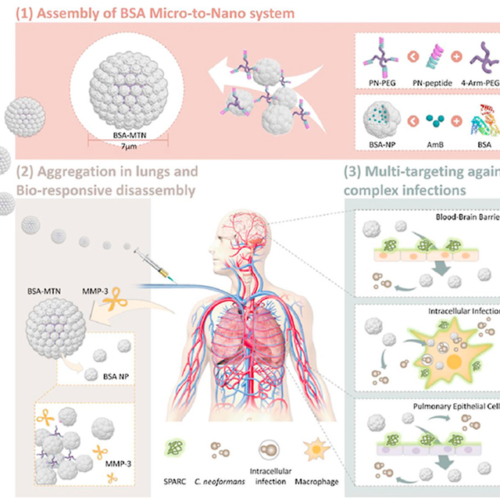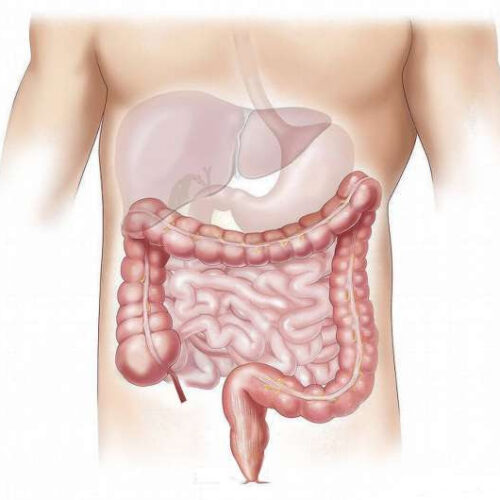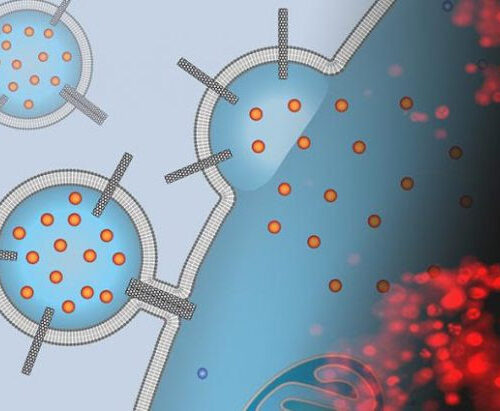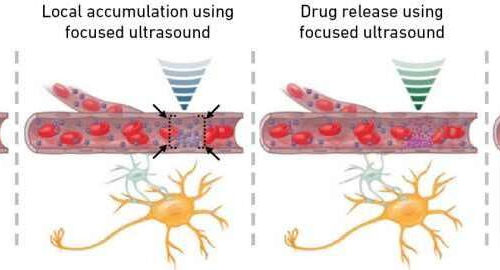INSTITUT NATIONAL DE LA RECHERCHE SCIENTIFIQUE – INRS IMAGE: PROFESSOR CHARLES RAMASSAMY AND JEAN-MICHEL RABANEL ANALYZING NANOPARTICLES ON THE NANOSIGHT NS 300, EQUIPMENT OBTAINED THANKS TO THE GENEROSITY OF THE CHARRON FAMILY THROUGH THE ARMAND-FRAPPIER FOUNDATION AS PART OF THE LOUISE & ANDRÉ CHARRON RESEARCH CHAIR ON THE ALZHEIMER’S DISEASE. CREDIT: INRS Treating diseases such...
Tag: <span>Drug delivery</span>
Bioresponsive micro-to-nano albumin-based systems for targeted drug delivery against complex fungal infections
COMPUSCRIPT LTD IMAGE: THE BIORESPONSIVE MICRO-TO-NANO ALBUMIN-BASED SYSTEM WAS ACCUMULATED IN THE LUNGS AND RESPONDS TO THE UPREGULATED MMP-3, THEN TARGETED THE LUNG TISSUE, BRAIN, AND INFECTED MACROPHAGES, REACHING MULTIPLE TARGETS AND EFFICIENT TREATMENT. CREDIT: APSB Bioresponsive micro-to-nano albumin-based systems for targeted drug delivery against complex fungal infections Just published in the latest issue of Acta...
Enhancing drug delivery with ultrasound
by Zach Winn, Massachusetts Institute of Technology Credit: CC0 Public Domain It can be difficult to get drugs to disease sites along the gastrointestinal tract, which spans the mouth, esophagus, stomach, small and large intestine, and anus. Invasive treatments can take hours as patients wait for adequate amounts of drugs to be absorbed in the right...
Direct drug delivery with carbon nanotube porins
Modern medicine relies on an extensive arsenal of drugs to combat deadly diseases such as pneumonia, tuberculosis, HIV-AIDS and malaria. Chemotherapy agents have prolonged lives for millions of cancer patients, and in some cases, cured the disease or turned it into a chronic condition. But getting those drugs into disease-ridden cells has remained a major...
Researchers design micro-sized capsules for targeted drug delivery — inspired by Russian pelmeni
SKOLKOVO INSTITUTE OF SCIENCE AND TECHNOLOGY (SKOLTECH) An international team led by a Skoltech researcher has developed a method of fabrication for biodegradable polymer microcapsules, made more efficient by turning to an unusual source of inspiration – traditional Russian dumpling, or pelmeni, making. The two papers were published in Materials and Design and ACS Applied Materials and Interfaces....
Millimeter-precision drug delivery to the brain
by Fabio Bergamin, ETH Zurich Scheme of the two-step procedure for accumulating and finally releasing encapsulated drugs locally. Researchers at ETH Zurich have developed a method for concentrating and releasing drugs in the brain with pinpoint accuracy. This could make it possible in the future to deliver psychiatric and cancer drugs and other medications only to those...
Remote-controlled drug delivery implant size of grape may help chronic disease management
Nanofluidic device delivered controlled doses HOUSTON METHODIST People with chronic diseases like arthritis, diabetes and heart disease may one day forego the daily regimen of pills and, instead, receive a scheduled dosage of medication through a grape-sized implant that is remotely controlled. Researchers from Houston Methodist successfully delivered continuous, predetermined dosages of two chronic disease medications using...
Cell-penetrating ‘nano-drills’ show promise for intra-cellular drug delivery
PORTLAND, Ore. – Researchers at Oregon State University and Oregon Health & Science University have created new nanomaterials able to cross cell membranes, establishing a novel platform for the intracellular delivery of molecular drugs and other cargo. The researchers explored how to tune the size, shape and morphology of materials known as cell-penetrating self-assembling peptide...
Tiny bubbles offer sound solution for drug delivery
Your brain is armored. It lives in a box made of bones with a security system of vessels. These vessels protect the brain and central nervous system from harmful chemicals circulating in the blood. Yet this protection system—known as the blood-brain barrier—also prevents delivery of drugs that could help treat patients with brain cancers and...
Magnetic implant puts the squeeze on drug delivery
A prototype “microspouter” with a Canadian dollar coin for scale When it comes to conditions such as diabetes, which require patients to administer daily injections or take lots of pills, scientists are increasingly looking to drug-dispensing implants as a more convenient alternative. One of the latest such devices, developed at the University of British Columbia, is...
- 1
- 2





